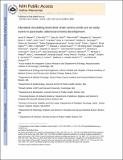Elevated circulating branched chain amino acids are an early event in pancreatic adenocarcinoma development
Author(s)
Mayers, Jared R.; Torrence, Margaret E.; Fiske, Brian Prescott; Davidson, Shawn Michael; Papagiannakopoulos, Thales; Dayton, Talya Lucia; Vander Heiden, Matthew G.; ... Show more Show less
DownloadVander Heiden_Elevation of.pdf (918.6Kb)
PUBLISHER_POLICY
Publisher Policy
Article is made available in accordance with the publisher's policy and may be subject to US copyright law. Please refer to the publisher's site for terms of use.
Alternative title
Elevation of circulating branched-chain amino acids is an early event in human pancreatic adenocarcinoma development
Terms of use
Metadata
Show full item recordAbstract
Most patients with pancreatic ductal adenocarcinoma (PDAC) are diagnosed with advanced disease and survive less than 12 months. PDAC has been linked with obesity and glucose intolerance, but whether changes in circulating metabolites are associated with early cancer progression is unknown. To better understand metabolic derangements associated with early disease, we profiled metabolites in prediagnostic plasma from individuals with pancreatic cancer (cases) and matched controls from four prospective cohort studies. We find that elevated plasma levels of branched-chain amino acids (BCAAs) are associated with a greater than twofold increased risk of future pancreatic cancer diagnosis. This elevated risk was independent of known predisposing factors, with the strongest association observed among subjects with samples collected 2 to 5 years before diagnosis, when occult disease is probably present. We show that plasma BCAAs are also elevated in mice with early-stage pancreatic cancers driven by mutant Kras expression but not in mice with Kras-driven tumors in other tissues, and that breakdown of tissue protein accounts for the increase in plasma BCAAs that accompanies early-stage disease. Together, these findings suggest that increased whole-body protein breakdown is an early event in development of PDAC.
Date issued
2014-09Department
Massachusetts Institute of Technology. Department of Biology; Koch Institute for Integrative Cancer Research at MITJournal
Nature Medicine
Publisher
Nature Publishing Group
Citation
Mayers, Jared R, Chen Wu, Clary B Clish, Peter Kraft, Margaret E Torrence, Brian P Fiske, Chen Yuan, et al. “Elevation of Circulating Branched-Chain Amino Acids Is an Early Event in Human Pancreatic Adenocarcinoma Development.” Nature Medicine 20, no. 10 (September 28, 2014): 1193–1198.
Version: Author's final manuscript
ISSN
1078-8956
1546-170X